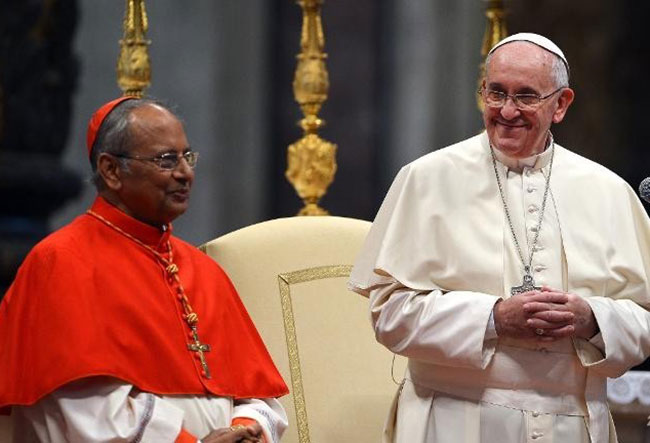Although the struggle for justice for the Easter Sunday terror attacks of 21 April, 2019 reached a certain climax with Colombo Archbishop His Eminence Malcolm Cardinal Ranjith meeting with the Catholic church’s Head, His Holiness Pope Francis and addressing the United Nations Human Rights Council (UNHRC), the struggle for the same would continue locally, said the local Catholic church.
Speaking to The Morning, Colombo Archdiocese Social Communications Director Rev. Jude Chrishantha Fernando said: “The Archbishop, who is currently on a visit to the Vatican, met with the Pope. He also addressed the UNHRC in Geneva, Switzerland. With these efforts, our struggle to demand justice for the Easter Sunday terror attacks reached a climax. However, the struggle that we launched locally would also continue.”
As another step towards that end, he said that the Catholic church has planned to hold a series of commemorations during this year’s Easter Sunday on 17 April and also on 21 April, the latter in line with the third anniversary of the said terror attacks. He noted that a number of special events have been planned, including special services on both 17 April and 21 April, adding it is hoped to finalise such when Archbishop Ranjith, who is currently in Rome, Italy, returns to Sri Lanka.
The Colombo Archbishop met with Pope Francis on 28 February at the Vatican, and the Easter Sunday terror attacks and the related investigations were discussed during the said meeting.
“The Archbishop is meeting the Pope after two years and he is especially focusing on informing him that we need help from the international community to seek justice for the victims of the Easter Sunday terror attacks,” National Catholic Social Communications Centre Director Rev. Cyril Gamini Fernando said at a press conference held on the same day.
Following the meeting with the Pope, Archbishop Ranjith met UN High Commissioner for Human Rights Michelle Bachelet and discussed about revealing the truth behind the Easter Sunday terror attacks and bringing justice to the victims, on 2 March, in an approximately 45-minute-long discussion.
Furthermore, claiming that there are attempts to harass and intimidate those who demand justice for the said terror attacks, the Colombo Archbishop on 7 March called upon the UNHRC and its Member States to devise a means to ensure that the truth behind the said terror attacks would be uncovered.
Making a statement at the 49th session of the UNHRC, the Archbishop said that the first impression of this massacre was that it was purely the work of a few Islamist extremists. However, he claimed that subsequent investigations have indicated that the said terror attacks were a part of a grand political plot.
“Despite our repeated requests and those of civil organisations pursuing the truth, the incumbent Government of Sri Lanka has failed to mete out justice to the victims. Instead of uncovering the truth behind the terror attacks and prosecuting those responsible, there are attempts to harass and intimidate those who clamour for justice. As a result, nearly three years after the horrendous crime, we are still in the dark as to what really happened on that Easter Sunday,” he said.
On 21 April 2019, Easter Sunday, three churches (St. Sebastian’s Church in Katuwapitiya, St. Anthony’s Church in Kochchikade, and Zion Church in Batticaloa) and three luxury hotels in Colombo (Cinnamon Grand Colombo, The Kingsbury Colombo, and Shangri-La Colombo) were targeted in a series of co-ordinated suicide bombings. Later that day, another two bomb explosions took place at a house in Dematagoda and the Tropical Inn Lodge in Dehiwala. A total of 269 people excluding the bombers were killed in the bombings, including about 45 foreign nationals, while at least 500 were injured.


